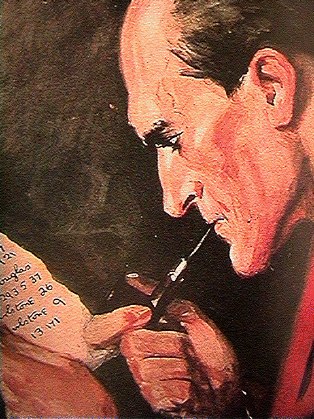Is Trust the Answer to Your Short-Term Memory Loss
 I think I’m more forgetful these days. Names, next steps, appointments; calls to return, to-do’s.
I think I’m more forgetful these days. Names, next steps, appointments; calls to return, to-do’s.
Is it due to age? Perhaps; every year I seem to get 365 days older.
Is it due to the complexity of the world? These days, 6 degrees of separation is so five minutes ago. It’s at least down to 4 degrees, closing in on 3.
Is it the ubiquity of mechanized devices to substitute for memory? Could be: kids who learn math on calculators forget how to do addition, and with wireless to-do lists integrating with everything, we have no good reason to exercise our memory muscles—maybe they atrophy?
Maybe. But there’s another explanation.
My doctor put it this way:
The brain circuitry for cognition is fairly complex. Before you can talk about memory, you have to talk about the whole process that precedes it.
If memory is flawed, sure, your memory recall capability can be to blame. But so can your memory storage capability—perhaps it slowly degrades.
Further back in the chain, maybe the storage placement function is to blame—memories are getting stored in the wrong places.
But most likely [says my doctor] it’s that the event was only weakly impressed on us in the first place. The photo was under-exposed. The signal to noise ratio was too low.
In other words, if you’re not paying full attention in the first place, your memory recall is doomed from the outset.
Multi-Tasking is Mugging My Memory
I think he may be right. Multi-tasking may be mugging my memory. I certainly see that happening in others—sitting in classes with blackberries and open laptops. Texting and phoning; reading and watching TV and texting.
A close friend made the same suggestion to me just a few days ago. Since then I’ve been making half-hearted efforts at stopping my multi-tasking addiction, and what I’ve discovered is–I’m pretty hooked.
Interestingly, paying attention is also at the heart of trust. Trust is inherently a relationship: a relationship between one who trusts, and one who is trusted.
At the heart of any relationship is the attention that must be paid, one to another. If attention is high, the relationship is strong. If it’s weak, then so is the relationship.
Why Focus is Central to Trust and to Memory
What is it about paying attention that makes it critical to both memory and to trust? I think it is the same phenomenon. Relationships, like events, only make impressions on us if we are open to them.
If I’m not paying attention to you, you can’t make an impression on me. And of course I won’t trust you. Which means you will not be trusted, and I will miss out on the experience of trusting. Bad stuff all around.
But if I pay attention to you, I will notice things about you, as well as being open to you. I may come to trust you; and you, being noticed by me, may behave in a more trustworthy manner. We allow ourselves to be paid attention to. Good stuff all around.
I think I’ll start small; batch processing email rather than staying constantly on the grid. Cold turkey is kind of frightening.
Who knew that fixing my multi-tasking might help my memory as well as my relationships?
I’ll keep you posted. If I remember.

 If you speak and teach corporate seminars, as I do, then you know what it feels like to look out at a sea of Blackberries. And, in many companies, at open-lidded notebooks too.
If you speak and teach corporate seminars, as I do, then you know what it feels like to look out at a sea of Blackberries. And, in many companies, at open-lidded notebooks too.